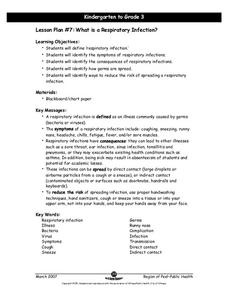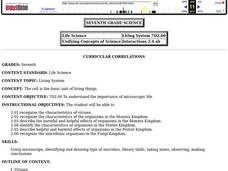Curated OER
Preventing and Treating Disease
For this disease worksheet, students will review the organs associated with the immune system including their specific functions. This worksheet has 10 matching, 8 true or false, and 5 short answer questions.
Curated OER
Defense Against Infectious Diseases
In this infectious disease defense worksheet, students will review the immune system including acquired, antibody, and cellular immunity. Students will then compare passive and active immunity to infectious diseases. This worksheet has...
Curated OER
Pandemic
High schoolers examine contagious diseases. They explore different types of bacteria and the illnesses they cause.
Curated OER
Some Similarities between the Spread of an Infectious Disease and Population Growth
If the infectious diseases and population growth instructional activity, students simulate the spread of an infectious disease by exchanging fluids in a lab activity. Students watch the spread of the disease and graph the spread of the...
Peel-Public Health
What Is Respiratory Infection?
Give your youngsters a comprehensive introduction to the importance of washing hands and preventing the spread of germs in three activities, which include identifying what germs are, discovering where germs live, and practicing a...
The New York Times
Sequencing the Stages: Understanding H.I.V. Infection at the Molecular Level
How does HIV operate at the molecular level? Pupils discover the progression from a healthy immune cell to one infected with HIV, watch an animation of the HIV life cycle, and finally identify each of the stages with illustrations...
Rice University
Biology for AP® Courses
An eight-unit electronic textbook provides a guide to AP® Biology. Each of the 28 chapters include an introduction, multiple lessons, a summary, review questions, and test prep questions. Teachers see how each lesson connects to a big...
Curated OER
Investigating the Method by Which the Body Defends Against Pathogens
Learners explore disease caused by bacteria and viruses, how they are transmitted, and how they exert their effects on their hosts. They explain how diseases, such as AIDS, are spread by exponential growth.
Curated OER
Classify the Microbes
Students classify microorganisms into categories based on their characteristics. Pupils use a taxonomic key to identify organisms. They classify certain bacteria, protists, and viruses using a classification or taxonmic key.
Howard Hughes Medical Institute
Test Your Knowledge of Microbes
How much do you know about microbes and our understanding of pathogens? A quick 15-question quiz tests a broad range of information related to microbes. The interactive presents a score at the end, providing a great opportunity to review...
Children’s Hospital of Philadelphia
Understanding How Diseases Spread
To boost disease prevention, high schoolers arm themselves with information about infectious diseases and how they spread. Scholars research the causes, prevention techniques, and identify high-risk groups especially vulnerable to a...
Children’s Hospital of Philadelphia
Case Study: The 1918 Influenza Pandemic – Factors Beyond the Biological that Influence the Spread of Disease
A very timely lesson looks at the social and political factors that affect the spread of disease. Using the 1918 Influenza Pandemic as a case study, pupils research factors that influenced the spread of the disease, including the role of...
Children’s Hospital of Philadelphia
Meet the Heros
Vaccine development is the focus of a lesson that explores its history, timeline, and how the scientific method aids the process. Following a discussion about Edward Jenner and Small Pox, learners answer questions in their journals then...
Exploratorium
Antibody Attack - Discover How Antibodies Launch Attacks on Invaders
Jump into the action and help antibodies defend against an antigen attack! Investigators match antibodies with antigens to model the body's identification and recall of specific pathogens. Young biologists also recognize that each...
Curated OER
Transcription, Translation, and the Genetics of Microbes
Learners construct various virus models using Fruit loops and Alphabits to represent nucleotides and molecules. They constructs capsomeres using shoes as the capsomeres and discuss various viruses.
Curated OER
Understanding Germs
Students investigate germs. In this health lesson, students use "glow lotion" on their hands and look at them under a black light. Students observe the cleanliness of their hands under the black light.
Curated OER
Word Scramble – Lesson 3
In this health worksheet, students identify and define vocabulary terms related to foodborne illness. They unscramble the words listed at the bottom of the sheet and use them to complete each of 8 blanks.
Curated OER
Hazard Mitigation: Bioterrorism
Students discuss different ways to spread infectious diseases. In this bioterrorism lesson, students model the rate of smoke emission using CalRoad software. They analyze the effects of airborne release of biological...
Curated OER
What Sticks Can Make You Sick
Pupils study adhesins and their receptors. In this science inquiry lesson students experiment to find adherence and use agglutination to identify adhesins.
Curated OER
Micro-Organisms
Students investigate micro-organisms with an on line activity. In this micro-organism on line lesson plan, students identify bacteria, viruses and fungi projected onto a white board. Students work in groups and use a computer and an on...
Curated OER
Micro-organisms
Learners examine how micro-organisms are living organisms that are often too small to be seen. They explain that micro-organisms may be beneficial or harmful.
Curated OER
BIO205-CH1- Intro Word Search
For this word search worksheet, students locate words related to biology. The word list includes protists, viruses, plants, spiral, and biotechnology.
Curated OER
Cells
Seventh graders look up pictures of viruses or pictures of models of viruses. Using pipe cleaners, beads, Styrofoam or other available materials make models of these shapes. They then observe a demonstration to show the effect of Tobacco...
Curated OER
Integrating Biology-Serendipity and Science
In this science and serendipity worksheet, students read about how Fleming discovered Penicillin by accident when observing bacteria that didn't grow where mold existed. Students answer questions about scientific discoveries.

























